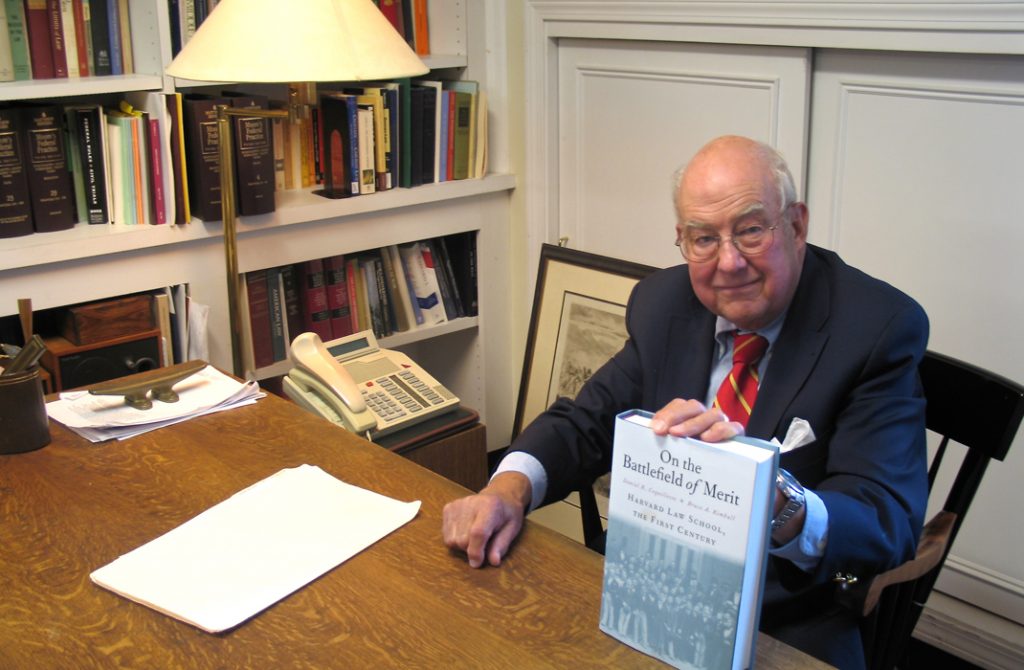“This book will be controversial,” says Professor Daniel Coquillette. He’s referring to The Battlefield of Merit, the first installment in a planned two-volume history of Harvard Law School, which he cowrote with Bruce Kimball, a historian of education. While published by Harvard’s own university press, Coquillette’s book, unlike previous histories of the school, documents flaws as well as triumphs. The flaws include most notably the law school’s long entanglement with slavery, which began with its founding, in 1817. The seed money used to establish the school came from a family that made its fortune running a Caribbean sugar plantation, and Joseph Story, an early dean as well as a US Supreme Court justice, upheld the Fugitive Slave Act in his opinion in Prigg v. Pennsylvania (1842).
Harvard Law in its early days was competing not with other law schools but with traditional legal apprenticeship. Under Story, the school offered three things that students couldn’t get from apprenticeships, says Coquillette: it taught law with a national perspective, with courses on constitutional law and legal philosophy, subjects rarely covered in apprenticeships; it admitted students based on merit; and it styled itself a training ground for national leaders. “These three ideas are so powerful that they’re still the creed of Harvard Law School today,” says Coquillette, “as well as the creed of every elite law school in the country.”
In striving to become a national institution, though, Harvard Law recruited nationwide, and for years one-third of the student body came from southern states, teeing up intramural debates between southern supporters of slavery and northern abolitionists. The bitterest debate came in 1854, when Edward Loring, a federal commissioner in Boston and also a Harvard Law lecturer, ruled against escaped slave Anthony Burns, whose owner was suing for his return. Southern Harvard Law students escorted the slaveowner to and from the proceedings, and Loring’s ruling set off riots. During Loring’s first class after the ruling, “southern students stood and applauded, and northern students hissed,” says Coquillette. The debates ended only after war came and southern students departed.
The law school’s great post-bellum leader, C.C. Langdell, like his predecessor Story, revolutionized legal education. Langdell introduced case method instruction, replacing old-fashioned treatises and recitations with casebooks and Socratic questioning. Langdell “talked about law as if it were a science,” says Coquillette, “He said, ‘We can dissect those cases the way you dissect a frog,’ ” deriving broad principles from a close acquaintance with the facts.
Langdell also made the law school more meritocratic, demanding college degrees of applicants and introducing class rankings and written exams. On the other hand, he violated his own meritocratic principles by resisting the admission of women to the school; he argued that “law is entirely unfit for the feminine mind.” Also under Langdell, the school cast a wary eye on applicants from Catholic institutions including Boston College.
Regardless of the abundant flaws, more of which will be revealed in volume 2 of the history, Harvard Law School has made lasting contributions to our history and to American legal education. Coquillette points to the most recent election for president of the United States, in which both candidates and the man who swore in the winner had Harvard Law degrees. Despite Story’s record on slavery, Coquillette says of his educational achievements, “I think Joseph Story is laughing in his tomb, and saying, ‘I achieved what I set out to achieve.’ ”
The author of Lawyers and Fundamental Moral Responsibility, The Anglo-American Legal Heritage, Francis Bacon, and The Civilian Jurists of Doctor’s Commons and editor of Law in Colonial Massachusetts and Moore’s Federal Practice, J. Donald Monan Professor of Law at Boston College Daniel R. Coquillette teaches and writes in the areas of legal history and professional responsibility. Coquillette was a law clerk for justice Robert Braucher of the Supreme Judicial Court of Massachusetts and Chief Justice Warren E. Burger of the Supreme Court of the United States. Among his many activities, Coquillette is an Advisor to the American Law Institute’s Restatement on Law Governing the Legal Profession and Reporter to the Committee on Rules of Practice and Procedure, Judicial Conference of the United States.


